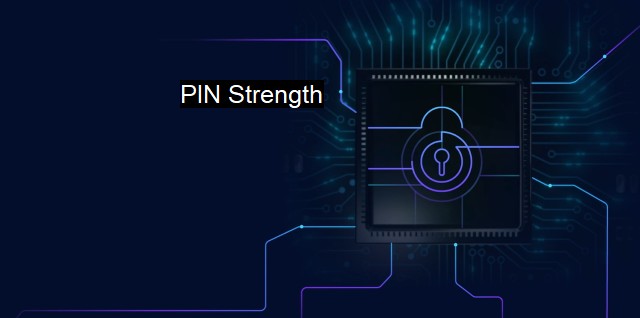What is PIN Strength?
Understanding the Significance of PIN Strength: Bolstering Security in the Cyber World
PIN Strength refers to the resilience of a Personal Identification Number (PIN) in defying unauthorized access attempts in the world of cybersecurity and antivirus. Basically, a "strong" PIN is one that is harder for unauthorized individuals to guess or crack using software tools designed for that purpose. The strength of a PIN, similar to a password, is an integral part of protecting personal or sensitive information.While a PIN is typically numeric and only contains four digits, newer systems allow for alphanumeric, and longer combinations, increasing the PIN's resistance to unauthorized access attempts. A stronger a PIN means graver difficulties potential attackers come across attempting to gain unauthorized entry. The strength of a PIN makes it a crucial component of multi-factor authentication systems frequently used in cybersecurity today.
Traditional four-digit PINs, as used by credit or debit cards, provide a selection pool of 10,000 possible combinations. While this might seem considerable, to modern computing power, it's trivial. Brute force attacks, where attackers try every possible combination, can crack such a PIN in a matter of seconds. This reality emphasizes the need for PIN strength.
The strength of a PIN can be enhanced in various ways. One method is increasing the length of the PIN. Extending a PIN from four digits to six increases the number of possible combinations from 10,000 to a million. allowing alphanumeric characters increases this number exponentially.
For instance, a system where the PIN may include all alphanumeric characters and case-sensitive letters would have 62 possible types (26 lowercase letters, 26 uppercase letters, and 10 numbers) for each digit. In such a system, a six-character PIN could have over 56 billion combinations. Simply put, the longer and more diverse the PIN, the harder it is for an attacker to guess.
Alongside increasing the length and variety, incorporating rules against easy-to-guess PINs also adds to PIN strength. Prohibiting easily guessed combinations like 1234 or repeated numbers reduces what attackers call the "search space," narrowing the possibilities that need trying. Similarly, accurate guesses come dangling when PINs are set as significant dates or simple keyboard patterns, considering increased predictability.
While this might seem like an approach closer to setting a strong password, the fundamentals remain the same. The core aim is to create a PIN that is substantially difficult to predict, balancing between usability and security ideally.
Monitoring and rate limiting also contribute to PIN strength. Even if an attacker can guess the PIN, if the system locks after a predetermined number of incorrect attempts, it makes brute force or guessing attacks unworkable. a system might allow three tries to enter the right PIN before it blocks further attempts.
Timeouts are another technique to increase the PIN's security. By forcing a user to wait increasingly long periods between incorrect attempts, an attacker's capacity to quickly run through all the options is severely constrained, hence slowing their progress dramatically.
PIN strength in the context of cybersecurity emphasizes creating, using, and implementing PINs that are tough for unauthorized persons to crack. By increasing the variety of assignable characters, imposing restrictions on predictable choices, and introducing measures to prevent unlimited fast guessing, the strength of a PIN can be substantially improved. It will always be a crucial part of our defense strategies against cybercrime, performing a valuable function in safeguarding our digital lives.

PIN Strength FAQs
What is meant by pin strength in the context of cybersecurity and antivirus?
Pin strength refers to the strength of a password, which is a combination of letters, numbers, and symbols set by a user to protect their online accounts. The stronger the PIN, the more difficult it is for hackers to guess or crack the password, and the better the protection against cyber threats.How can I test the strength of my PIN?
There are various tools available online that allow you to check the strength of your PIN or password. Some antivirus software also provides password strength meters that indicate the strength of your password by measuring its length, complexity, and uniqueness.What are the best practices for setting a strong PIN?
To set a strong PIN, you should avoid using common words, pet names, birth dates, or easily identifiable personal information. Instead, use a mix of upper and lowercase letters, numbers, and symbols. It's also recommended to use longer passwords, ideally over 12 characters in length. Additionally, it's important to use a unique PIN for every account and to change your password regularly.Why is having a strong PIN important for cybersecurity and antivirus protection?
Having a strong PIN is critical for preventing unauthorized access to your online accounts and protecting your personal information from cybercriminals. Weak passwords can be easily guessed or cracked using automated tools, leaving your accounts vulnerable to identity theft, fraud, or malware attacks. Strong PINs are an essential part of a multi-layered cybersecurity strategy that helps safeguard your digital life.| | A | | | B | | | C | | | D | | | E | | | F | | | G | | | H | | | I | | | J | | | K | | | L | | | M | |
| | N | | | O | | | P | | | Q | | | R | | | S | | | T | | | U | | | V | | | W | | | X | | | Y | | | Z | |
| | 1 | | | 2 | | | 3 | | | 4 | | | 7 | | | 8 | | |||||||